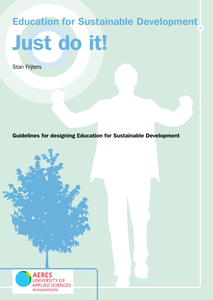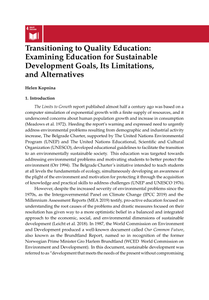The study of moral reasoning in relation to sustainable development is an emerging field within environmental education (EE) and education for sustainable development (ESD). The vignette method was used to evaluate the perception of the relationship between environmental and social issues in the Dutch upper elementary school children. This case study is placed within two broad areas of tension, namely between the need to address urgent environmental problems and to promote pluralistic democratic learning; and between the value of environment as an economic asset and deep ecology perspective. Results of this study indicate that the children are able to critically think about the moral dilemmas inherent in sustainable development and distinguish between different values in relation to environment. https://doi.org/10.1016/j.stueduc.2013.12.004 https://www.linkedin.com/in/helenkopnina/
MULTIFILE

Sustainable development has become a crucial part of our modern society and our education. Sustainability is a complex concept. After all, what is considered sustainable to us now may not necessarily be so in the future. We need to continually review our judgments with regards to sustainability. Education for Sustainable Development is about knowledge, attitude, behaviour and values, in which the relationship between a social, an ecological and an economic perspective is always factored in. But what does this education look like? Education for Sustainable Development. Just do it! was the motto for the practice-oriented study by Aeres University of Applied Sciences Wageningen, involving four schools and two universities. This publication describes the theoretical principles of Education for Sustainable Development and the design criteria as were used in this practice-oriented study. This publication describes the theoretical principles of Education for Sustainable Development and the design criteria as were used in this practice-oriented study. These design criteria can help us develop and implement Education for Sustainable Development.
DOCUMENT

Building on the Millennium Development Goals, Education for Sustainable Development (ESD) and Education for Sustainable Development Goals (ESDG) were established. Despite the willingness of many educational institutions worldwide to embrace the SDGs, given escalating sustainability challenges, this article questions whether ESDG is desirable as “an education for the future”. Many challenges outlined by the SDGs are supposed to be solved by “inclusive” or “sustainable” economic growth, assuming that economic growth can be conveniently decoupled from resource consumption. Yet, the current hegemony of the sustainability-through-growth paradigm has actually increased inequalities and pressure on natural resources, exacerbating biodiversity loss, climate change and resulting social tensions. With unreflective support for growth, far from challenging the status quo, the SDGs and consequently, the ESDGs, condone continuing environmental exploitation, depriving millions of species of their right to flourish, and impoverishing future generations. This article creates greater awareness of the paradoxes of sustainable development and encourages teaching for sustainability through various examples of alternative education that emphasizes planetary ethic and degrowth. The alternatives include Indigenous learning, ecopedagogy, ecocentric education, education for steady-state and circular economy, empowerment and liberation. “This is an Accepted Manuscript of an article published by Taylor & Francis in 'Journal of Environmental Education' on 01/20/20, available online: https://www.tandfonline.com/doi/full/10.1080/00958964.2019.1710444 LinkedIn: https://www.linkedin.com/in/helenkopnina/
MULTIFILE

This article will discuss social, environmental, and ecological justice in education for sustainable development (ESD) and Education for Sustainable Development Goals (ESDG). The concept of sustainable development and, by extension, the ESD, places heavy emphasis on the economic and social aspects of sustainability. However, the ESD falls short of recognizing ecological justice, or recognition that nonhumans also have a right to exist and flourish. An intervention in the form of an undergraduate course titled Politics, Business, and Environment (PBE) will be discussed. As part of this course, students were asked to reflect on the three pillars of sustainable development: society, economy, and environment, linking these to the fourth concept, ecological justice or biospheric egalitarianism. Biospheric egalitarianism is characterized by the recognition of intrinsic value in the environment and is defined as concern about justice for the environment. Some of the resulting exam answers are analyzed, demonstrating students’ ability to recognize the moral and pragmatic limitations of the anthropocentric approach to justice. This analysis presents ways forward in thinking about the role of “ecological justice” as the ultimate bottom line upon which both society and economy are based. https://doi.org/10.3390/educsci10100261 LinkedIn: https://www.linkedin.com/in/helenkopnina/
MULTIFILE

Innovation is crucial for higher education to ensure high-quality curricula that address the changing needs of students, labor markets, and society as a whole. Substantial amounts of resources and enthusiasm are devoted to innovations, but often they do not yield the desired changes. This may be due to unworkable goals, too much complexity, and a lack of resources to institutionalize the innovation. In many cases, innovations end up being less sustainable than expected or hoped for. In the long term, the disappointing revenues of innovations hamper the ability of higher education to remain future proof. Against the background of this need to increase the success of educational innovations, our colleague Klaartje van Genugten has explored the literature on innovations to reveal mechanisms that contribute to the sustainability of innovations. Her findings are synthesized in this report. They are particularly meaningful for directors of education programs, curriculum committees, educational consultants, and policy makers, who are generally in charge of defining the scope and set up of innovations. Her report offers a comprehensive view and provides food for thought on how we can strive for future-proof and sustainable innovations. I therefore recommend reading this report.
DOCUMENT

Despite the willingness of many educational institutions worldwide to embrace Education for Sustainable Development and Education for Sustainable Development Goals, critical scholars have pointed out that the very enterprise of sustainable development is not without its contradictions. Therefore, any education that engages with sustainable development needs to be carefully reviewed, rather than supported, in its ambition to promote the supposedly universally desirable aims. The rhetoric of sustainable development as meeting the needs of present and future generations is largely anthropocentric in failing to take nonhuman species into account when setting up pragmatic and ethical objectives. Similarly to the Millennium Development Goals (MDGs) that have helped to raise living standards across the world, but have largely failed to address environmental sustainability challenges, the Sustainability Development Goals (SDGs) tend to prioritize “inclusive economic growth” at the expense of ecological integrity, which is very likely to negatively affect not only nonhuman species but also future generations and their quality of life. Thus, as this chapter will argue, universally applicable Education for Sustainable Development Goals (ESDGs) is problematic in the context of addressing the long-term sustainability for both human and nonhuman inhabitants of the planet. Given escalating climate change, biodiversity loss, pollution, and depletion of natural resources, this chapter questions whether ESDGs can qualify as a desirable “quality education”. The paradoxes of sustainable development and ways forward that seem a better alternative for ESDG include indigenous/traditional learning, ecopedagogy, ecocentric education, and education for degrowth, steady-state, and Cradle-to-Cradle and circular economy. Advantages of universal education are also highlighted, as any education that supports basic literacy, numeracy, and values attributed to the intrinsic rights of humans and nonhumans can help students to be equipped to deal with social and environmental challenges. https://doi.org/10.3390/books978-3-03897-893-0-1 LinkedIn: https://www.linkedin.com/in/helenkopnina/
MULTIFILE

Neoliberal discourse often conceptualizes nature in relation to its market utility and economic development. This article will address the role of metaphors in shaping neoliberal discourse in business education. The aim of this article is to reveal reasoning patterns about environmental problems and economic development in students of sustainable business minor. The case study described in this article involves business students at The Hague University in The Netherlands. This case study aimed to explore a shift in student understanding of environmental problems and economic development before and after the intervention. The results suggest that critical curriculum can inform students about the alternative conceptions as well as instruct them about potential solutions to the sustainability challenges. The article culminates with the argument that without goal-oriented education for sustainability; neoliberal education may not permit transcendence from unsustainable practices. https://doi.org/10.3390/su6117496 https://www.linkedin.com/in/helenkopnina/
MULTIFILE

With the emergence of education for sustainable development (ESD), robust literature on ethics and ESD has emerged; however, ecocentric perspective developed within environmental ethics is marginalized in current ESDebate. The questions discussed in this article are as follows: Why is the distinction between anthropocentric and ecocentric view of environment salient to ESD? How can this distinction be operationalized and measured? Until now, little has been done to address complement quantitative studies of environmental attitudes by qualitative studies, exploring the sociocultural context in which ecocentric or anthropocentric attitudes are being formed. Neither of existing scales engaged with the interface between environmental ethics and sustainable development. This article will discuss ESD in the context of environmental ethics and present the results of the case study conducted with the Dutch Bachelor-level students. Results of qualitative evaluation of the scale measuring ecocentric and anthropocentric attitudes will be presented, and the new Ecocentric and Anthropocentric Attitudes toward the Sustainable Development (EAATSD) scale will be proposed.
DOCUMENT

Education for sustainable development (ESD) presents challenges to secondary science teachers. Characteristic aspects such as action-oriented teaching, stance-taking, interdisciplinary problem solving, and emotional and value-oriented teaching cause tensions for teachers accustomed to traditional science teaching. To help future science teachers face these challenges, understanding how these tensions are rooted in teaching visions is crucial. In the context of teacher education, this study aims to explain pre-service science teachers’ visions on these tension inducing aspects of ESD. Through a qualitative analysis of interviews and written reflections of ten participants in a course on ESD, we document beliefs and experiences that underlie their visions. A belief that supports teaching ESD is that education should contribute to a sustainable future. Prevalent beliefs that cause tensions with ESD are that education should not impose values; that one’s subject matter knowledge is insufficient; and that the scientific knowledge is unreliable. Experiences from the course that influence these beliefs, are confrontations with visions of peers, pupils, and professionals; exposure to ESD teaching practices; and inquiry into a socio-scientific issue, all of which alleviated tensions. Findings help teacher educators understand pre-service science teachers’ visions and provide suggestions for activities that foster vision development.
MULTIFILE
This article reflects on implications of presenting nature as a social construction, and of commodification of nature. The social construction of nature tends to limit significance of nature to human perception of it. Commodification presents nature in strict instrumental terms as ‘natural resources’, ‘natural capital’ or ‘ecosystem services’. Both construction and commodification exhibit anthropocentric bias in denying intrinsic value of non-human species. This article will highlight the importance of a deep ecology perspective, by elaborating upon the ethical context in which construction and commodification of nature occur. Finally, this article will discuss the implications of this ethical context in relation to environmental education (EE) and education for sustainable development (ESD). https://doi.org/10.3384/cu.2000.1525.146931 https://www.linkedin.com/in/helenkopnina/
MULTIFILE
